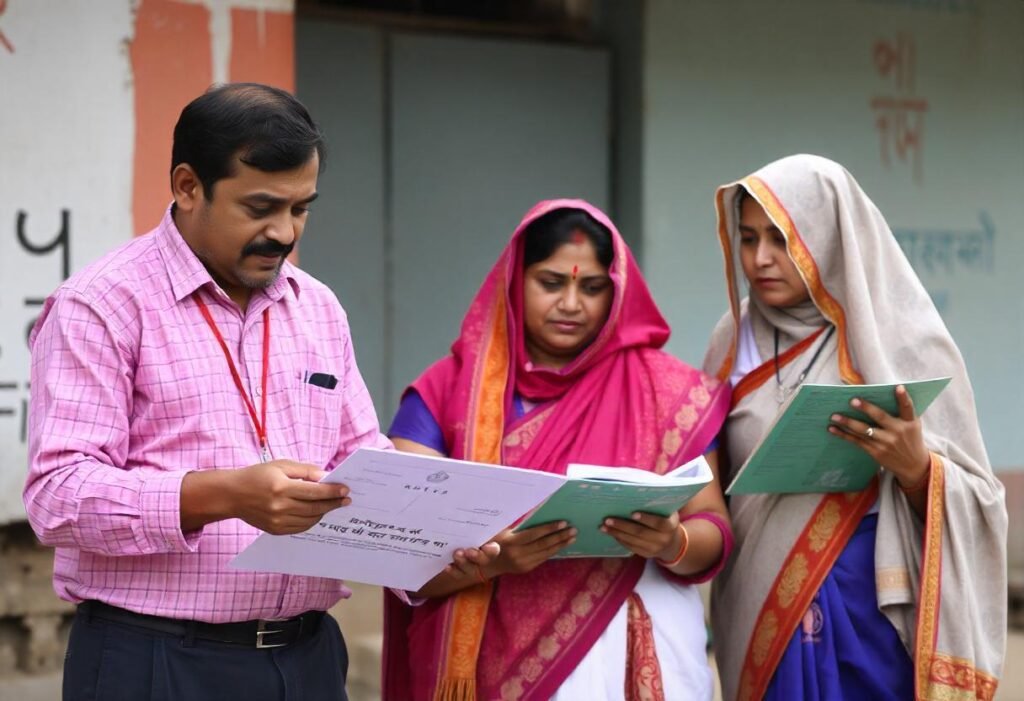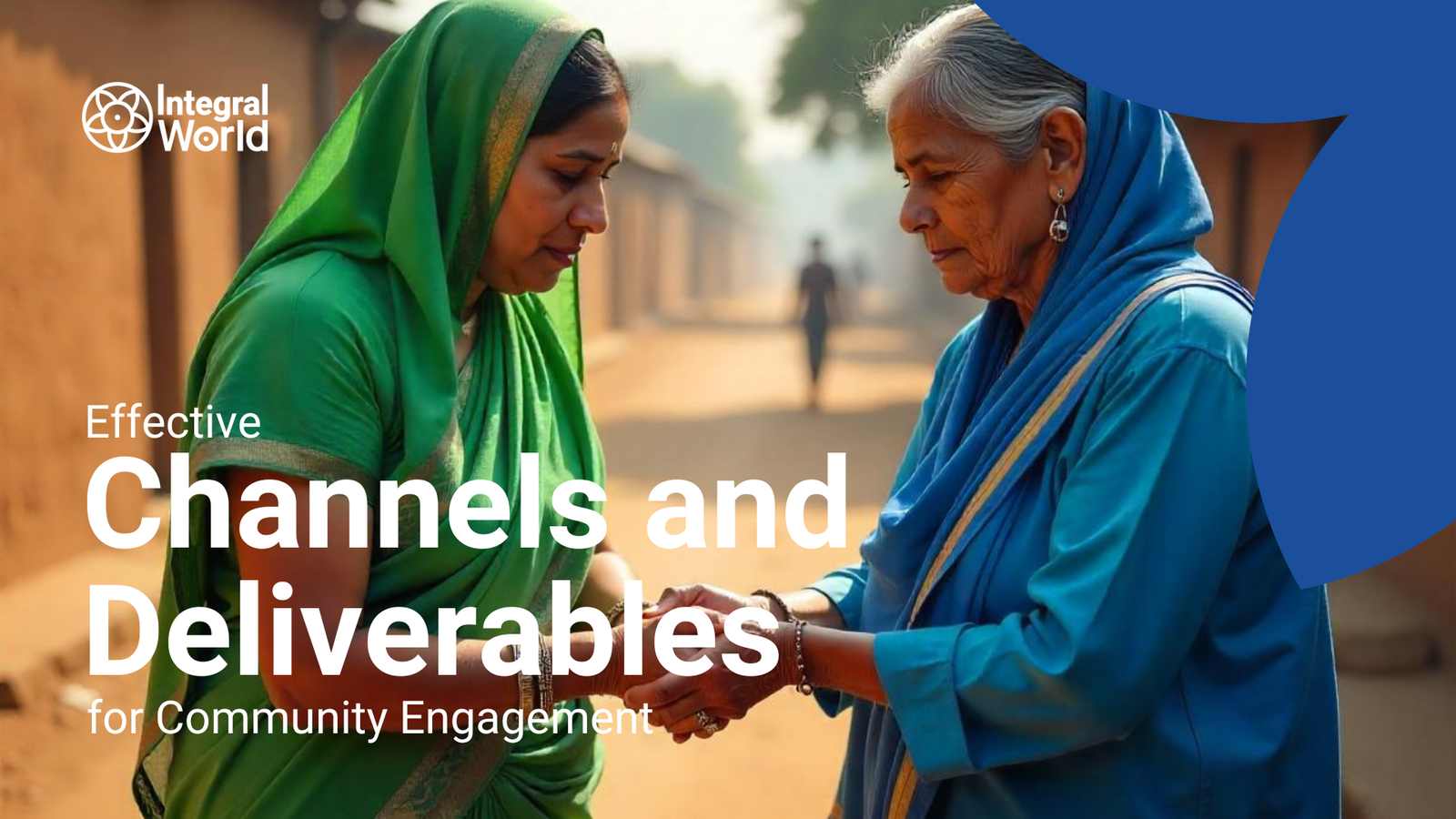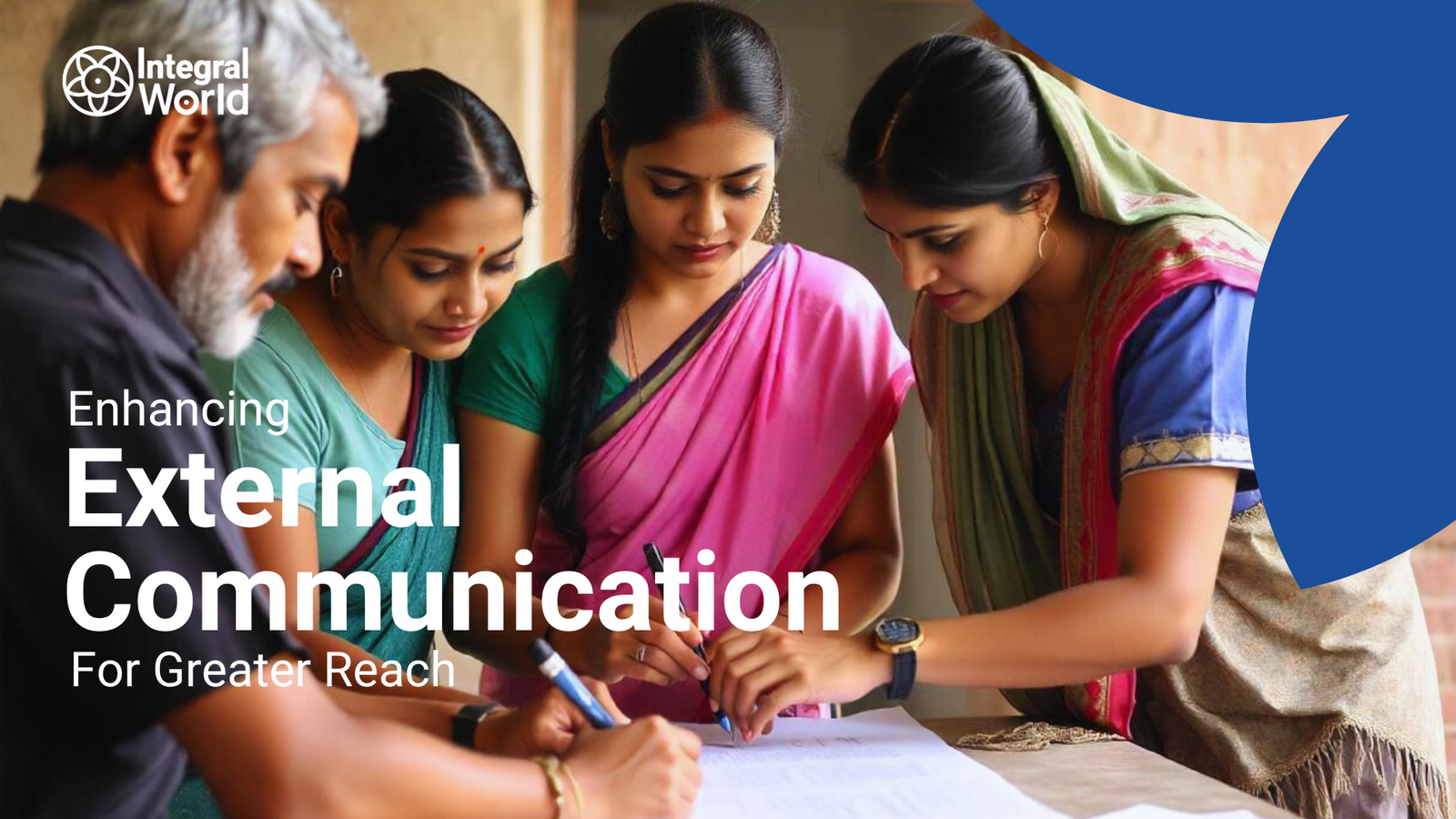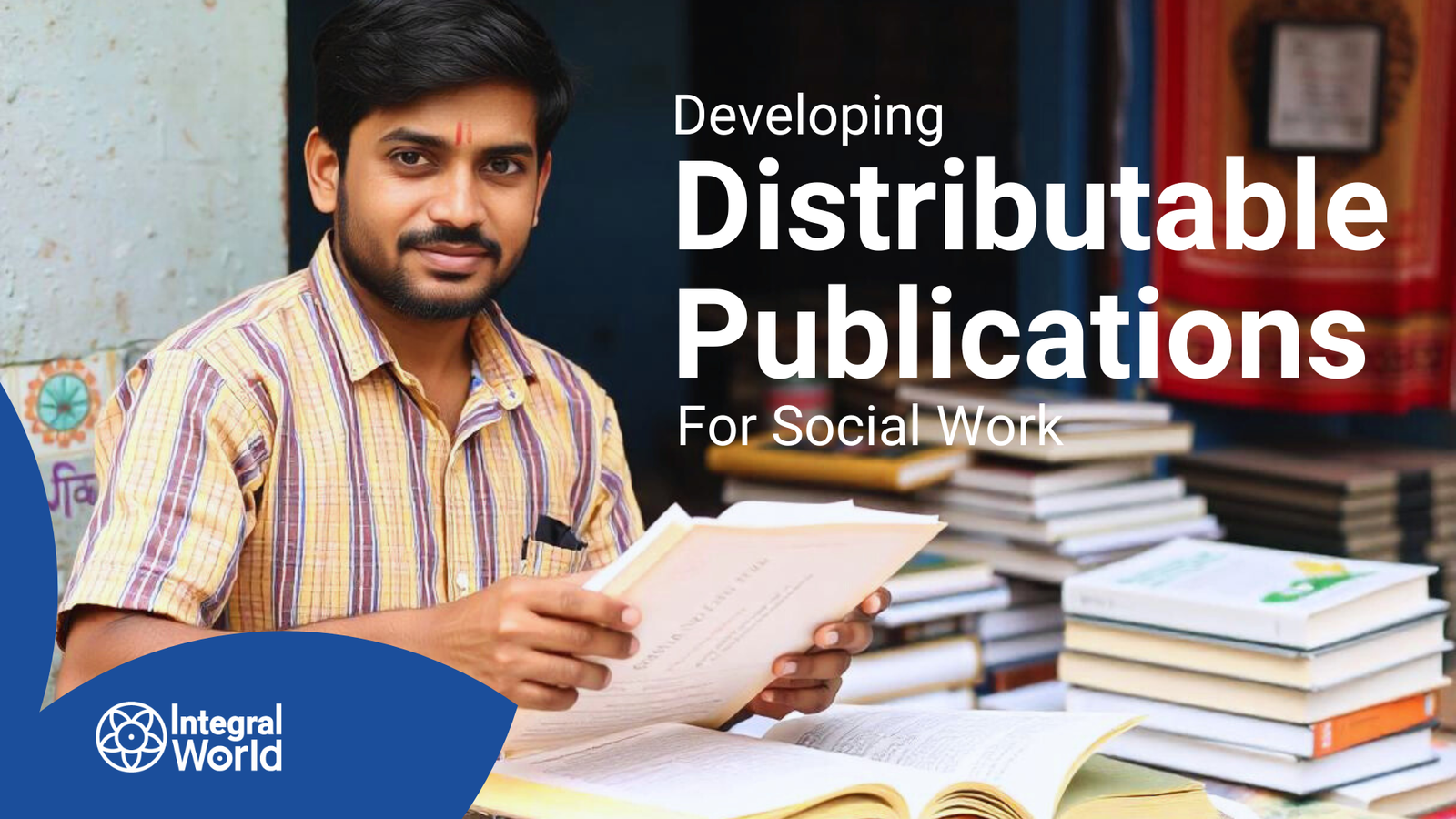Community engagement is key to sustainability. This article guides organizations like Integral World in choosing the best channels and deliverables to build connections, boost participation, and achieve long-term goals.
Continue readingEnhancing External Communication for Greater Reach
NGOs like Integral World can boost their mission through stronger external communication. This paper offers expert tips and strategies for greater outreach.
Continue readingDeveloping Distributable Publications for Social Work
Non-profit sector, where the importance of trust and credibility cannot be overstated, requires development of distributable publications that are truly authentic. These include reports, brochures and educational materials whose contents are beyond information but also a reflection of the values, mission, objectives and visions of the organisation in question. Integral World is committed to helping non-profits create authentic, impactful publications that build trust and drive success.
The role of authenticity in developing distributable publications for social work by offering practical strategies with real life examples as well as suggestions on how to maintain it. We will discuss how authenticity promotes trust and success among people and how leadership can promote an authentic culture within an organisation.
The Power of Authenticity in Distributable Publications
Publishing works that are truly honest means more than just being truthful; it involves complying with your core principles, maintaining transparency while also engaging with your audience significantly. For organisations whose main focus is social work this authenticity is important in fostering trustworthiness as well as competence or long term relationships with stakeholders.
Why Authenticity Matters
Building Trust: The veracity inherent in any publication shows what an organisation is all about. Organisations can therefore develop a connection with their audiences by providing accurate information, sharing real-life stories, acknowledging difficulties among other things. It is such trust that makes it possible to achieve cooperation which results into effective collaboration.
Demonstrating Credibility: Being true to oneself indicates commitment towards one’s mission statement plus norms guiding operation. In case organisational information has truthfulness attached then its legitimacy becomes grounded thus enabling it to get support from many angles since there are positive implications recognized by more people.
Engaging the Audience: Readers find themselves resonating with genuine content. Therefore organisations can create works that establish stronger connections between themselves and those who read them through talking about actual experiences like their own or general issues. A deeper connection and resonance with the audience is established.

Examples of Authentic Publications in Social Work
The Human Rights Campaign (HRC)
The success of the Human Rights Campaign has been attributed to its authentic publications. Although, Its annual reports and advocacy materials are based on true stories from the communities that they serve. Their ability to use personal experiences and address real concerns has enabled HRC to engage supporters who have spearheaded change in the LGBTQ+ community.
Example: In their “2019 Annual Report,” HRC shares personal stories from those impacted by their efforts, as well as data and statistics. This combination of human narratives and factual information contains a comprehensive picture of their impact which is authentic.
The Red Cross
When it comes to its literature, The Red Cross is known for having an open line of communication that is easy to decipher. These include reports and brochures respectively about their operations, challenges they have faced and achievements so far made among others. Transparency through sharing information establishes trust between them plus donors as well as stakeholders.
Example: Besides just numbers, statistics or figures, there are also personal testimonies regarding disasters against which this publication speaks about nothing else but how individuals’ lives were refurbished after experiencing such events.. By doing so, they contribute towards enhancing authenticity thus strengthening their relationship with constituencies.
Tips for Maintaining Authenticity in Publications
Emphasise Transparency
Authenticity can be enhanced by being transparent with regard to your organisation’s activities, finance or performance statements among other things. Do not exaggerate facts but make sure that everything you say is correct especially when it comes to admitting mistakes or areas that need improvement.
Share Real Stories
Some people will want you to introduce actual experiences witnessed by beneficiaries themselves or workers within your organisation alongside volunteers who are committed towards supporting your cause in order for readership resonates with these contents further making an impression on them personally while this is permitted and done with ultimate respect for privacy laws.
Use Data Responsibly
However, present data in a way that is truthful and situational. Employ visualisations to make the information transparent but ensure that the graphical representations are accurate and do not mislead readers. Provide context so that people can understand the meaning of the data.
Reflect Your Values
Make your publications align with your organisation’s mission and at its core values. Avoid content that appears disconnected or contrary to your organisation’s principles. Authenticity means being oneself, instead of being someone else who we think others expect us to be.
Engage Stakeholders
Involving stakeholders in the publication process. Receive feedback from beneficiaries, donors, community members among other target groups as a way of ensuring that you are not taking it upon yourself to speak on issues which are beyond their experiences and understanding. It also creates a sense of ownership and authenticity.

The Role of Leadership in Fostering Authenticity
Authentic organisational cultures cannot be developed without effective leadership. Leaders determine how authenticity is perceived and practised within an organisation. Here are some ways leaders can nurture authenticity:
1. Model Authentic Behavior
Leaders should demonstrate genuineness by acting with clarity, honesty and consistency in their actions and messages. By doing this they would have set standards for both staff members as well as stakeholders.
2. Encourage Open Communication
Urge for open communication platforms within the organisation setting itself up towards becoming an entity that encourages openness will help towards achieving this aim; where all staff members can discuss freely any problem they might encounter internally or externally or even any hindrances making them not to perform optimally or together solve problems.
3. Support Authentic Practices
4. Recognize and Reward Authenticity
Acknowledge initiatives reflecting genuineness through rewards. Identify achievements that show commitment to genuine representation as well as transparent communication. This will encourage authenticity among the employees.
Actionable Tips for NGOs
- Develop Clear Guidelines: Establish guidelines for generating authentic content. Ensure all team members understand the significance of transparency and principles of authentic communication.
- Invest in Training: Train staff on effective communication and publication practices, equipping them with the skills to develop high-quality authentic material.
- Leverage Technology: Enhance your publications by utilising digital tools and platforms such as data visualisation software, content management systems etc. These advanced tools can help create engaging and transparent materials.
- Measure Impact: Continuously evaluate how your publications affect stakeholder engagement and trust. Use feedback and data analytics to constantly improve the quality of your content and practices used in its development..
- Build Partnerships: Collaborate with other organisations, professionals to enrich the credibility and reach of your publications. Such partnerships may bring more insights into the issue or provide additional resources necessary to ensure authenticity.
Conclusion
Building trust, demonstrating credibility, involving stakeholders in social work requires creating disseminable publications that reflect authenticity. NGOs which stress exposing hidden stories, adopting transparency tactics as well as keeping within a company’s vision can produce more impactful publications resonating with their audience than others do. Integral World actively assists non-profits in enhancing the authenticity of their communications by providing guidance on best practice methodologies.
Are you ready for authentic publications from your organisation? Contact us at Integral World today so we can help you develop amazing materials that bring positive change while enhancing community bonds!



